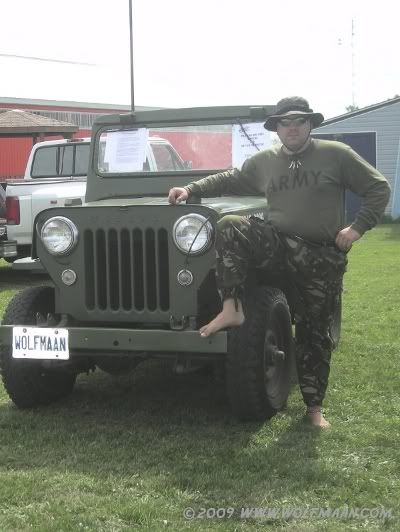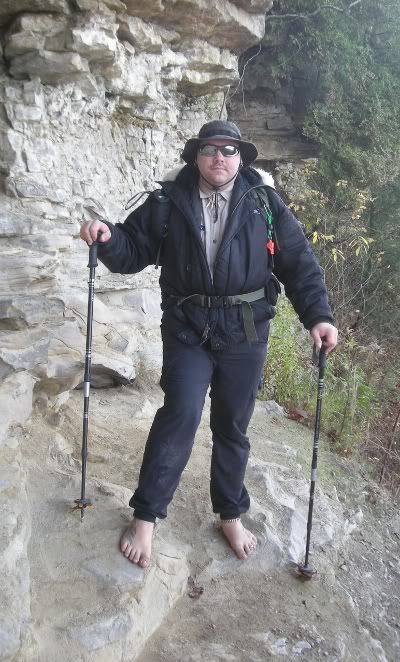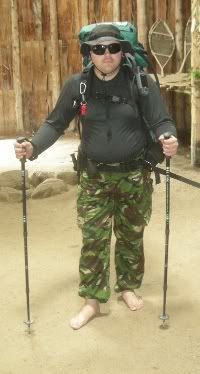1957 M606 Military Jeep
Greg Kolowzu
Military History Journal
During the Second World War (1939 – 1945) a new type of vehicle was created. The likes of which the world had never seen. The compact, petrol powered lightweight 4wd jeep.
Wolfmaan's Willys jeep is a military version of the Willys CJ3B produced from 1952 to 1968 with a total of 155,000 are produced including both Military and Civilian models.
The M606 was pretty much just the CJ-3B straight off the assembly line, with the same serial numbers as the civilian version. The military version took the heavy-duty options like larger tyres and springs, a special rear bumper to hold the Pintle Hook and bumperettes, and a black-out lamp on the front left fender. The military CJ-3B also had a specific windshield not used on civilian models.
One of the most unique differences between the M606 and the M-38 (which look identical) is the M606 has a 6-volt electrical system rather than the standard military 24-volt. The M606 also has a longer wheelbase, and has an F-Head hurricane engine rather than the Flat Head – this explains the “High Hood” look of the M606.
Some CJ-3B’s purchased by the Military Police and Navy did not have the military blackout and marker lamps.
Approaching Wolfmaan's Willy's m606 jeep today, it's small stature still looks impressive. His M606 is in immaculate condition. Bright and shiny tyres connected to two steel frame rails which protrude from the front and hold the all metal front bumper.
The bumper, displaying a customised Ontario license plate “Wolfmaan” is overshadowed by a metal plate in the shape of a maple leaf which has a Legion logo on it surrounded by the words “Lest We Forget”. These plates are commonly seen on the graves of World War II veterans. “It was a gift from my grandfather, who was very active in the Royal Canadian Legion.” Wolfmaan comments.
Feeling the metal of the vehicle is impressive. There is no give and the vehicle feels solid. They certainly don't make vehicles like this anymore.
Climbing into the vehicle, it becomes apparent how much ground clearance the M606 has compared to a modern day car. Sitting in the drivers seat, a thin Bakelite steering wheel is directly infront of you. The seat is not adjustable and is bolted over-top of the petrol tank.
Simple is the word that best describes it's interior. With no fancy bells, whistles or switches there is a small key hole, three knobs and a spedometer which has a petrol gage and temperature guage.
One black knob is for the head lamps, another is the choke and a third controls the idle of the vehicle.
Beside you on the left hand side sits three separate gear shifters. The one closest to the driver is a simple, manually operated three-speed transmission. First and Third gear are non-synchronised and second gear is synchronised. The middle shifter is for for the four wheel drive on and off, and the far lever is for four wheel drive high and low. Certainly more complex than today's automatic transmissions with a single lever and push-button four wheel drive.
The glove box sits under the passenger seat. You must lift the passenger seat until it touches the windscreen to expose what looks like a toolbox welded in place. It's quite large and was designed to hold a lot of stuff. Currently it has Wolfmaan's ownership, insurance and cleaning cloths stored in it.
Starting up the vehicle it can be described as having “that army jeep sound” as it slowly cranks over and coughs to life. Adjusting the choke is paramount or the vehicle will stall out shortly after starting up.
The vehicle runs remarkably well for rolling off the assembly line over 50 years ago. “I give her a new oil filter and new oil each year” Wolfmaan says. “I run synthetic oil in the engine, normally Royal Purple or Lucas Oil brand”.
As Wolfmaan takes the seat with his bare tattooed feet on the metal pedals, it becomes apparent how exposed you are in an antique war machine such as this. Looking out the passenger side there is nothing separating you from the road, and no seat belt to hold you in. “This isn't a modern day vehicle” Wolfmaan says. “You have to grab it by the reigns and keep control and drive at all times or like a bronco, it will buck you off.” Surely difficult to drive vehicles such as this would put an end to using mobile phones while driving.
Listening to the 4 cylinder engine and 3 speed transmission wind up, we speed off from his driveway onto a busy road you could feel the engine work hard to maintain 80km/h, which is wasn't designed to do.
The vehicle would take quite some time to get used to as by today's standards does not feel safe. You're exposed, not strapped in, and right on the scene if you get into an accident. Wolfmaan reminds me that it's just like riding a motorcycle with four wheels and carries the same dangers, but there is no requirement to wear a helmet.
“The best part about driving an antique war vehicle like this are the people and stories” Wolfmaan says. He goes on to explain that he often meets veterans who remember learning to drive in these exact vehicles. Often veterans take the time to share stories of their experiences they've had in Jeeps during various wars.
“I was honoured to have two Korean War veterans ride in the back of my M606 during a Veterans Day parade in 2009” Wolfmaan said “It's so nice to keep history alive and remember those who died for the little freedom we have left”
As a Canadian Adventurer, Wolfmaan says this is his favourite vehicle to drive for short trips around his home town of Niagara-on-the-lake, as well as neighbouring cities running errands or just driving down backroads on weekends.
When asked if he ever takes the vehicle off road he quickly says “The vehicle was designed to take humans to the ends of the earth. I want to keep this one in mint condition and try never to take it off the road if I can help it”
It was an honour and pleasure to meet adventurer Wolfmaan and take a quick drive in his historic war machine. Sadly there are few people who take the time to preserve and operate these pieces of our past.






